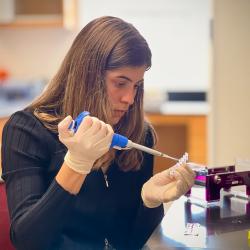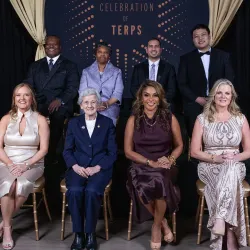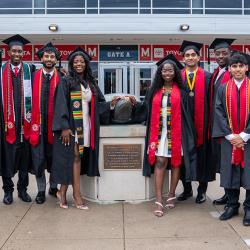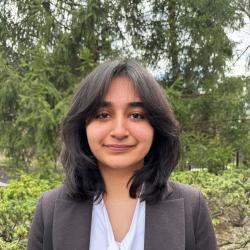UMD Students Win Gold Medal Again at International Genetically Engineered Machine Competition
University of Maryland students took home a gold medal for the second year in a row at the International Genetically Engineered Machine (iGEM) competition held in Boston, Mass., on Sept. 24-28, 2015. The five-day iGEM competition brought together over 4,000 participants in 280 teams from around the world to showcase new research and inspire tomorrow’s leaders in the field of synthetic biology.
The UMD (UMaryland) team developed an alternative technique for plasmid maintenance. A plasmid is a small, circular, double-stranded DNA molecule that is distinct from a cell's chromosomal DNA. Plasmids are used to introduce genes of interest into bacteria, but the effectiveness of this technique is limited because organisms eventually eject the plasmid. To counter this, scientists insert a gene for antibiotic resistance into the plasmid. Next, the cells grow in a medium containing antibiotics to get rid of cells that do not contain the antibiotic-resistance gene, ensuring the desired plasmid gets replicated.
While this technique has proven to be reliable and effective, the increasing use of antibiotics for medical and agricultural purposes has led to an increase in the number of pathogens that harbor antibiotic-resistance genes. As a result, scientists are looking for alternatives to antibiotic use for plasmid maintenance to prevent the spread of antibiotic-resistant pathogens.
The UMD team created and tested an alternative: a plasmid carrying Hok/Sok, a selective killing mechanism, instead of antibiotic-resistance genes. The students found that their alternative plasmid with Hok/Sok was as effective for plasmid maintenance as using antibiotics.
The team also constructed an inexpensive polymerase chain reaction (PCR) cycler, which it used to replicate DNA. They started with parts from a hairdryer and an Arduino controller.
For their synthetic biology efforts, their contributions to the iGEM bank of “BioBricks,” and their outreach to the iGEM community and the general population, the team was awarded a gold medal at the competition. Furthermore, the team received one of five nominations for the best "new application".
UMD iGEM team members included biological sciences majors Kimia Abtahi, Juhye Kang, Dylan Taylor and Adam Wahab; bioengineering majors Aditya Biswas, Robert Hand, Kara Huie and George Zhang; public health science major Samiha Ahmed; computer science and biological sciences double major Dania Benalla; management and biological sciences double major Kevin Fan; biochemistry major Chun Loke; Arabic studies and biological sciences double major Stephanie Sansbury; biochemistry and biological sciences double major Pavel Vlasov; chemical engineering major Sarah Wain; and team president, biological sciences and biochemistry major Iowis Zhu.
Twelve of the 16 students also participate in the Integrated Life Sciences (ILS) program in the university’s Honors College.
The team’s advisors included Ed Eisenstein (associate professor in bioengineering), Jason Kahn (associate professor in chemistry and biochemistry), Boots Quimby (associate director of ILS) and Nathan Barber (B.S. ’15, bioengineering). Naren Bokisham, Navadeep Boruah (bioengineering), Jason Hustedt (chemistry and biochemistry), Angela Jones and Tania Tschirhart (bioengineering) provided technical assistance.
The UMD team raised $35,000 from independent fundraising, donations, and support from the College of Computer, Mathematical, and Natural Sciences; the Clark School of Engineering; and ILS to fund its project.
The team plans to participate in the 2016 competition and is recruiting members. Take a look at the team’s Facebook page to find out more information.
Writer: Rachael Romano







